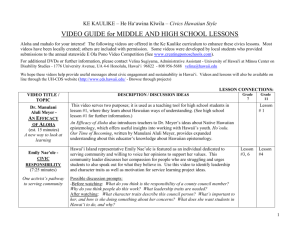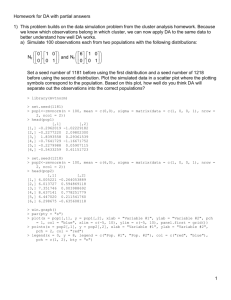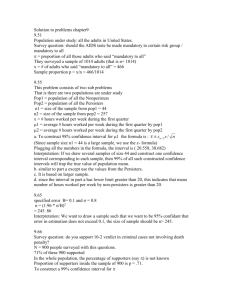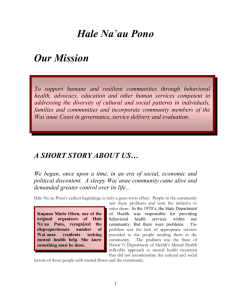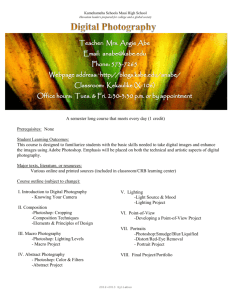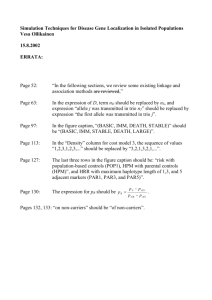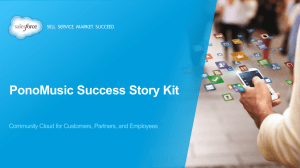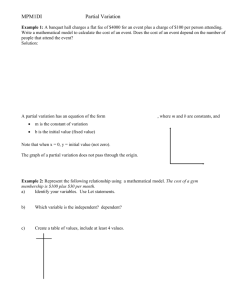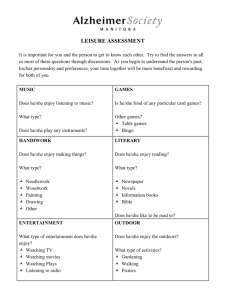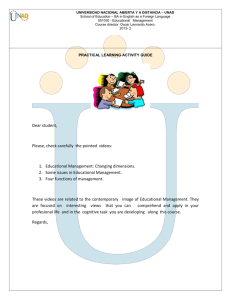WORD - Center on Disability Studies
advertisement
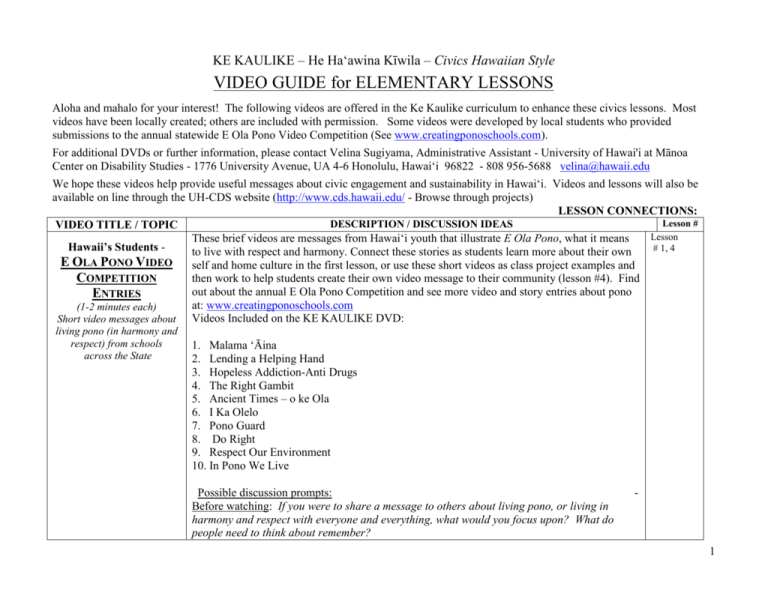
KE KAULIKE – He Ha‘awina Kīwila – Civics Hawaiian Style VIDEO GUIDE for ELEMENTARY LESSONS Aloha and mahalo for your interest! The following videos are offered in the Ke Kaulike curriculum to enhance these civics lessons. Most videos have been locally created; others are included with permission. Some videos were developed by local students who provided submissions to the annual statewide E Ola Pono Video Competition (See www.creatingponoschools.com). For additional DVDs or further information, please contact Velina Sugiyama, Administrative Assistant - University of Hawai'i at Mānoa Center on Disability Studies - 1776 University Avenue, UA 4-6 Honolulu, Hawai‘i 96822 - 808 956-5688 velina@hawaii.edu We hope these videos help provide useful messages about civic engagement and sustainability in Hawai‘i. Videos and lessons will also be available on line through the UH-CDS website (http://www.cds.hawaii.edu/ - Browse through projects) LESSON CONNECTIONS: Lesson # DESCRIPTION / DISCUSSION IDEAS VIDEO TITLE / TOPIC Lesson These brief videos are messages from Hawai‘i youth that illustrate E Ola Pono, what it means Hawaii’s Students # 1, 4 to live with respect and harmony. Connect these stories as students learn more about their own E OLA PONO VIDEO self and home culture in the first lesson, or use these short videos as class project examples and COMPETITION then work to help students create their own video message to their community (lesson #4). Find out about the annual E Ola Pono Competition and see more video and story entries about pono ENTRIES at: www.creatingponoschools.com (1-2 minutes each) Short video messages about Videos Included on the KE KAULIKE DVD: living pono (in harmony and respect) from schools across the State 1. Malama ‘Āina 2. Lending a Helping Hand 3. Hopeless Addiction-Anti Drugs 4. The Right Gambit 5. Ancient Times – o ke Ola 6. I Ka Olelo 7. Pono Guard 8. Do Right 9. Respect Our Environment 10. In Pono We Live Possible discussion prompts: Before watching: If you were to share a message to others about living pono, or living in harmony and respect with everyone and everything, what would you focus upon? What do people need to think about remember? - 1 After watching: What message did each video makes want their audience to understand? How is this relevant to our lives? Which issue might be something we can do something about? Blanche Pope Elementary students - KABOLO’S WAY OF PONO (4:35 minutes) Watch students enact a peer’s story they felt had important meaning as they learn what it looks like to “be pono” From Kūkulu Nā Uapo – MANA’O OF KUPUNA (9:00 minutes) A collection of short words of wisdom by cultural practitioners and kupuna from Hawai‘i Capt. Charles Moore ON THE SEAS OF PLASTIC www.TED.com (7:23 minutes) Footage that makes you stop and think about using plastics Lesson This short student production of a classmate’s story is about relationships and how trying to be helpful might not have the best results, yet it could still be a pono thing to do. Link this story to #1, 3 lesson #1 when students are learning about proverbs or lesson #3 when they explore local communities. Possible discussion prompts: -Before watching: Do you remember a time when you tried to help but things didn’t really work out well? Did you ever have anyone try to help you when things didn’t go well? How did these experiences make you feel? After watching: What did you like about this video? What did the students want their audience to learn? How might this message help us with our lives? This video, originally featured in a science curriculum, shares a vast amount of information Lesson #1 about values, protocols, and the lifestyle led by elders and cultural practitioners, past and present. Possible discussion prompts: -Before watching: What things to you hear your kupuna or grandparents share with you to help you in life make good choices? After watching: What new things did you learn from people in the video about making good life choices? If you want students to learn about ocean pollution, have them watch this video with Captain Moore so they can see the impact of plastics on our world. This video can help students understand we have one ocean and planet needing care. It can also provide motivation for community service projects. Lesson #4 Possible discussion prompts: -Before watching: Who has seen plastic and other rubbish at one of our beaches? How do you think plastic gets into our ocean? What do you think life on this planet might be impacted by plastic and other garbage in our ocean? -After watching: What is causing this huge amount of rubbish in the ocean? How might it impact life on this planet? What can each person do about this problem? 2 Lesson #4 Blanche Pope Elementary Students OUR JOURNEY TOWARD PONO (5.50 minutes) Watch what one group of students expressed as their vision of a pono* school (*pono = harmony and respect for all) Ka’u students - YOKWE EN AD EKAJOUR (Together We Are Strong) (15.5 minutes) A story about a former island home OTHER RELEVANT VIDEO RESOURCES Students at Blanche Pope Elementary have learned about Hawaiian values and ways of living, including what it means to be pono, or in harmony and balance with everyone and everything. They documented their pono experiences, which can help others see experiences of another community beyond theirs. Find out more about the video contest that this film was submitted for by going to www.creatingponoschools.com Possible discussion prompts: - Before watching What do you think pono means? How might it look at a school? After watching: What did you learn about this school’s journey toward pono? Do you think this journey ever ends? Why or why not? Created by students from Ka’u on Hawai‘i Island with their teacher and a community videographer, this homegrown documentary tells the story of how these students’ home of Enewetak in the Marshall Islands was devastated by U.S. Nuclear testing in the 1940’s and 1950’s. To order additional copies go to http://www.cds.hawaii.edu/main/store/ . Lesson #4 Molokai Return to Pono: This 9 minute video that shares the past, present, and future of Molokai, with a focus on the people, culture, environment, and community life. Available for purchase (See Amazon), or “Google” the title to view it at a free internet site like: http://www.in.com/videos/watchvideo-molokai-return-to-pono-4228485.html Life in these Islands: A 1 hour locally produced TV special by Don Mapes & Kawika Kahiapo. For short videos or to buy this DVD visit www.lifeintheseislands.com A Mau A Mau-To Continue Forever – Cultural and Spiritual Traditions of Moloka'i with Hãlau Hula O Kukunaokalã - Produced by John Kaimikaua & Nalani Minton To buy the DVD contact kakaimi@alulike.org 3
